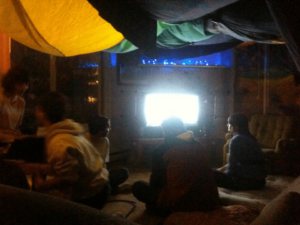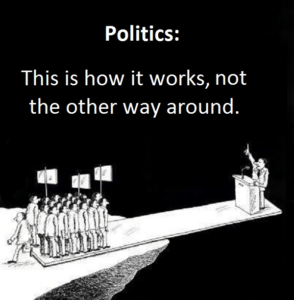This was originally written for and published on a different website (“Ask an Anarchist”) which has now been incorporated into the NAC site. The views expressed are just one person’s opinion and may not represent what people in NAC believe now. This post was written by J.
Revolutionary acts often takes forms you may not expect. You don’t have to start a spontaneous thousand-person march or liberate academic journal articles for the public to freely access. Living a revolutionary life can start with choosing where you lay your head at night.
What’s the highest number of housemates you’ve had at any one time? Three? Six? What about 12?
At our communal house we have 12 housemates. We call the house The Academy, because it’s where we’re all learning about life.
Here are three ways that communal living is revolutionary:
#1 Decision Making

Quiet hours are decided by consensus, so the late night socialites and the early birds are all happy. (Writing in the mountain-area says: “We invite you to be quieter… like this landscape.”)
There’s a lot of decisions to make when you’re living with 12 people. Who is going to do each chore? How much do rooms cost? Do we want to have a big potluck gathering this weekend? How do we create more bonding time for housemates? When should the common spaces quiet down? Do we want to invite a particular person to live with us or not? And the most common question of all: How do we keep the kitchen clean?
How do we keep things moving with so many voices? Perhaps one “benevolent dictator” could decide everything, then no one would have to expend much energy. Or perhaps we could all vote on topics, and the majority would get their way, and the minority would just deal with it.
What works best for us is to use a consensus decision making model, where we strive for unanimous agreement, and settle for an overwhelming majority in agreement. When someone has an idea that might effect the whole house, they make a proposal, we hear concerns, and adjust the proposal until we reach consensus. The objective is to give everyone an opportunity for their voice and opinions to be a part of the decisions we make. When people are in open, respectful communication with one another, it’s a far more pleasant space to live in.
We all moved into this house by our own free will, and we all work together to keep it clean, comfortable, and playful. There’s no need for us to surrender some of our power over to a “leader” who directs us. What would it be like to live in a society where this were the case everywhere? Where people freely associated for their mutual benefit, and no person was able to wield power over another person.
#2 Community-centered

The fruits of a food liberation operation from a nearby dumpster.
The United States has a proudly individual-centered culture. There is an understandable appeal to having individual rights and access to any item whenever you want it. But, is this “me focused” attitude creating the most vibrant, thriving world possible?
When you live in a community, your focus begins to shift from “what’s good for me” to “what is good for us?” Each person shares an interest in the well-being of everyone in the house. If someone hears about an offer for free compost, they pass it along because even though they don’t garden, they eat the food we grow. When we are in abundance, especially after liberating food from nearby dumpsters, we share the abundance with everyone.
In this culture, we are scarce on examples of what it looks like to give attention to the needs of a community as well as ourselves. When we live communally, we have the opportunity to practice this on a daily basis.
#3 Mutual Aid
In our community, we share resources and share the work. We purchase food as a group and share in the shopping. We cook food together and share the meals. We all clean the house, and there is less to clean because the work is spread out. A few housemates have offered to have their vehicle be the “community car,” so now there are fewer vehicles on the road, and we still have access to one if we really need it. And it’s common for housemates to offer up beds that aren’t in use to visitors and friends.

Sharing shopping and food makes life more simple and easy for everyone.
We don’t need a dozen refrigerators, a dozen sets of kitchenware, a dozen shovels, or a dozen copies of a book. We just need one, and we all share, saving everyone money, reducing waste, and building more interdependency.
By cooperating on a small scale, we are demonstrating our vision of a society built around mutual aid, where each person helps others and receives help from them, and everyone benefits.
Community is Revolutionary
Living a revolutionary life is all about challenging the existing power structures and creating something new. Living in a community house is a revolutionary act for that very reason. Out with the old, in with the new. Community houses won’t create a thriving world on their own, but each house is a beacon of light, sharing an inspiring vision of what it looks like to focus on “we” instead of “me.”
There are all kinds of options for communal living: rent a bigger apartment/house than you’re used to, move in to a co-op house, or share rooms in the place you already have. Each additional person is a new person to learn from and another contributor to the creation of vibrant community.
How could/does communal living benefit you and your loved ones? Let us know in the comments.





